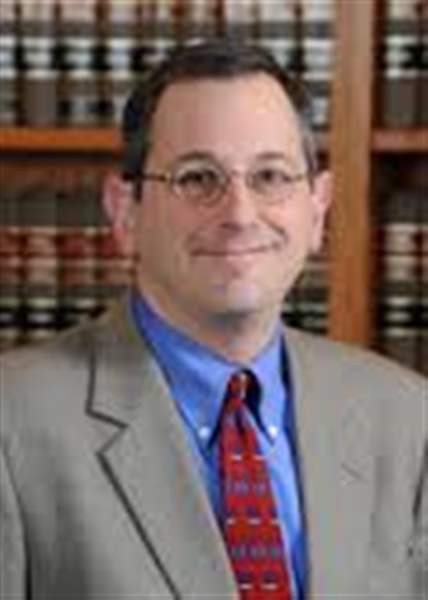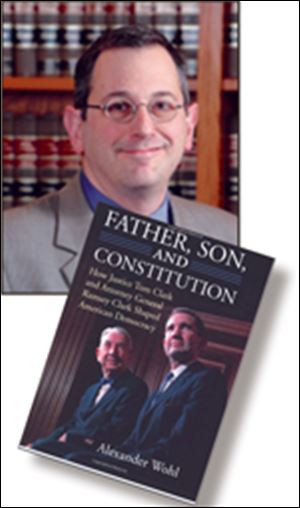
Toledo native to speak about his book, ‘Father, Son, and Constitution’
Alex Wohl spent six years researching, writing about Justice Tom Clark, Attorney General Ramsey Clark
12/31/2013
Wohl

Alex Wohl will talk about his new book from 11 a.m. to 1 p.m. Sunday at the Barnes and Noble campus store at the University of Toledo.
Father-son power teams aren’t rare in American politics, going back as far as John Adams and son John Quincy Adams, and more recently the Kennedys and the Bushes.
Lower profile are familial pairings in the judicial branch and other governmental arenas.
Toledo native Alex Wohl takes a look at a particularly effective twosome, whose politics didn’t always mesh, in his new six-year effort, Father, Son, and Constitution: How Justice Tom Clark and Attorney General Ramsey Clark Shaped American Democracy (University Press of Kansas, 486 pages) Wohl, who lives near Washington, will speak about the book in Toledo from 11 a.m. to 1 p.m. Sunday at the Barnes and Noble store, 1430 Secor Rd. on the University of Toledo campus. He’ll also address the Thaddeus Walinski History Group at 6:30 p.m. Monday at the Beirut Restaurant.
The father tended toward conservatism and the son was what might be called a flaming liberal. Both were very attuned to civil rights and privacy issues.
“An underlying theme of my book is the examination of how individuals can balance the use of government power against individual rights,” Mr. Wohl said. ‘It’s always that balance.”
Mr. Wolh, 52, writes speeches for Margaret Hamburg, commissioner of the Food and Drug Administration, and for years has written biographical and law articles. The son of Toledo attorney Doris Wohl and the late Julian Wohl, who taught psychology at the University of Toledo, he grew up in the Lincolnshire neighborhood of West Toledo, completing Whitmer High School in 1979. He graduated from Brandeis University and earned a law degree at American University, where he teaches part time.
Tom Clark (1899 to 1977), was a friend of President Harry Truman, who appointed him U.S. Attorney General in 1945 and to the U.S. Supreme Court in 1949. He retired from the court in 1967 at the relatively young age of 67; his son, Ramsey Clark, had been named U.S. Attorney General by President Lyndon Johnson, and the elder Clark wanted to eliminate any suggestion of conflicting interest between the two when Justice Department cases were brought to the Supreme Court.
“But there was no requirement for Tom Clark to leave,” Mr. Wohl noted. “It was quite a remarkable sacrifice, giving up a lifetime tenured position.”
When the elder Clark left the bench, LBJ filled his spot with Thurgood Marshall, the first African American Supreme Court Justice.
Tom’s son, Ramsey Clark, was probably the most liberal of the 82 U.S. Attorney Generals to date, Mr. Wohl said. Ramsey Clark, 86, began working for the AG’s office in 1961 and in 1967 was named U.S. AG, only a two-year stint because of LBJ’s exit from the Oval Office in January, 1969. Nevertheless, he played important roles in passing the Voting Rights Act of 1965 and the Civil Rights Act of 1968, and dealt with gun control, fair housing, and desegregation of the universities of Mississippi and Alabama. “He was balancing all these different things at one time,” Mr. Wohl said.
After 1969, he led progressive campaigns including supporting civil and human rights, opposing the War on Terror, and offering legal defense to controversial figures including Saddam Hussein and Slobodan Milosevic.
“He’s a remarkable guy. For many people, he’s a lightning rod. He’s very liberal, sometimes representing people no one else will. A lot of people take issue with him,” said Mr. Wohl, adding that Ramsey Clark believes “if you’re not going to defend people accused of the worse types of crime, then what good is it having a legal system?”
His father, however, was conservative on many issues.
In an interview with The Blade, Mr. Wohl said he’d wanted to write about the Supreme Court or a judge for years. In 1995, he was working as speech writer for the commissioner of the U.S. Department of Education when he won a yearlong fellowship to the U.S. Supreme Court, where his work focused on judicial administration — making sure the law and the courts run efficiently and ethically — an area of Tom Clark’s expertise.
He chose the topic about six years ago, and contacted Ramsey Clark and over several years, conducted about 35 hours of recorded interviews. In all, he interviewed more than 20 people, including the late U.S. Attorney General Nicholas Katzenbach; Ramsey Clark’s former law clerks; Ramsey’s son, Thomas Clark II (a Justice Department environmental attorney who died in November), and Ramsey’s sister, Mimi Clark Gronlund, who wrote a biography on her father, Thomas. “She was invaluable to me,” said Mr. Wohl. He did extensive research in Texas on his father’s archives, the LBG School of Public Affairs, the Truman Museum in Independence, Mo., and the Library of Congress.
Justice Tom Clark arrived in Washington in 1937 and was connected to several major U.S. events, including the internment of Japanese Americans before and during World War II and in the early 1950s, helping to spur black listing of people suspected of being communists or socialists. He paved the way for broader civil rights for African Americans by taking as federal cases infractions of civil rights laws at a time when states were expected to, but sometimes refused to, enforce those laws.
“He was a man of his times. He was anti-communist. He believed he was protecting the rights of Americans by enforcing things that would suppress subversion.” However, when it came to civil rights, “he saw people as people,” Mr. Wohl said.
“It’s fascinating; he continued to evolve through his whole life. He continued to protect rights of individuals, for example, against self-incrimination. I think he begins to learn from his son [Ramsey] as well,” supporting issues such as the legalization of marijuana and abortion.
“If you read this book you’ll gain a history of America from the 1930s on up,” Mr. Wohl said.
Contact Tahree Lane at tlane@theblade.com and 419-724-6075.